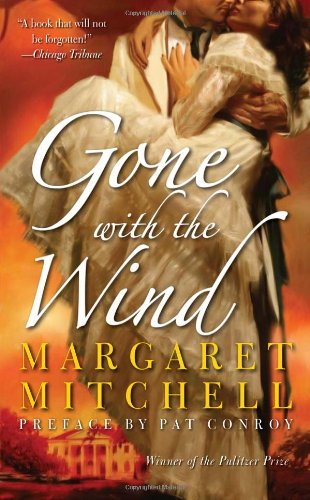I never saw the movie other than the "don't give a damn" moment, so this is not so much a review as it is some musings I encountered while reading Margaret Mitchell's Gone with the Wind. After all, we know it's "good" considering it won a Pulitzer Prize. If you don't know the premise of the book, it's widely available so I won't rehash it here.
I found the language relatively more modern and easier to read than I expected for a book written in the 1930s. I bought the book to read on vacation since I'd never read it before, always wanted to, and I knew it would last me the whole time, so I only had to carry one book. I read the first few sentences of the book at the book store because I wondered if it would be archaic, but immediately thought, "I can read this." So I bought it.
I thought it was a bit odd that a large chunk of the book's beginning didn't mention Scarlett's son. There were servants to care for him, for sure, but I wondered about nursing and why he wasn't mentioned. But then I thought this might have been intentional - make the reader forget him like Scarlett seemed to do.
There are incidents of omniscience and head-hopping, but the vast majority is from Scarlett's point of view and it becomes obvious immediately that she is the main character. Scarlett is not an especially likable character, so I was trying to determine her "save the cat" moment per Blake Snyder's screenwriting book of the same name. The only thing I could come up with was that modern women (at the time) might've related to or admired her spirit and independence, which makes sense to me since it was written not too long after women got the right to vote.
The theme of the book seems to be how it's human nature to want something you don't or can't have. It explores several purposes for marriage: love, lust, convenience, security, and loyalty. The character arc for Scarlett is subtle. She didn't change much. She'd thought she had changed and had a big revelation toward the end, but then she reverts back to her old ways, digging in her heels and willfully pursuing what she thinks she wants. She does this despite realizing that when she got what she wanted in the past, it wasn't really what she'd wanted.
I hope these observations didn't contain too many spoilers. I now want to watch the movie so I can see how they adapted this massive story to the screen. Despite its nearly 1,500 pages, it only took me a month to read it, so on a can't-put-it-down-scale of one for I couldn't even finish it to ten for I was up until the wee morning hours, I give it an eight and a quarter.
Source: Mitchell, Margaret. (1936). Gone with the Wind. Macmillan Publishing Company.
